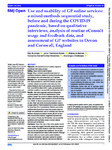Use and usability of GP online services: a mixed-methods sequential study, before and during the COVID-19 pandemic, based on qualitative interviews, analysis of routine eConsult usage and feedback data, and assessment of GP websites in Devon and Cornwall, England
| dc.contributor.author | Jones, Ray | |
| dc.contributor.author | Tredinnick-Rowe, JF | |
| dc.contributor.author | Baines, R | |
| dc.contributor.author | Maramba, Inocencio Daniel | |
| dc.contributor.author | Chatterjee, Arunangsu | |
| dc.date.accessioned | 2022-03-11T14:00:27Z | |
| dc.date.available | 2022-03-11T14:00:27Z | |
| dc.date.issued | 2022-03-07 | |
| dc.identifier.issn | 2044-6055 | |
| dc.identifier.issn | 2044-6055 | |
| dc.identifier.other | e058247 | |
| dc.identifier.uri | http://hdl.handle.net/10026.1/18934 | |
| dc.description.abstract |
<jats:sec><jats:title>Objectives</jats:title><jats:p>We explored use and usability of general practitioner (GP) online services.</jats:p></jats:sec><jats:sec><jats:title>Setting</jats:title><jats:p>Devon and Cornwall, England.</jats:p></jats:sec><jats:sec><jats:title>Design</jats:title><jats:p>Mixed-methods sequential study based on qualitative interviews, analysis of routine eConsult usage and feedback data, and assessment of GP websites.</jats:p></jats:sec><jats:sec><jats:title>Methods</jats:title><jats:p>First, we interviewed 32 staff and 18 patients from seven practices in June 2018. Second, we used routinely collected consultation meta-data and, third, patient feedback data for all practices using eConsult from June 2018 to March 2021. Lastly, we examined GP websites’ usability in January 2020 and September 2021.</jats:p></jats:sec><jats:sec><jats:title>Results</jats:title><jats:p>Interviews suggested practices infrequently involved patients in eConsult implementation. Some patients ‘gamed’ the system to achieve what they wanted. Usage data showed a major increase in eConsult resulting from COVID-19. Women used eConsult twice as much as men. Older had similar eConsult consultation rates to younger patients. Patient feedback forms were completed for fewer than 3% of consultations. Patients were mostly satisfied with eConsult but some had concerns about its length and repetitiveness, lack of continuity over time and between eConsult and medical records. We did not find clear evidence that patients’ suggested improvements were acted on. Finally, few GP websites met accessibility guidelines and may hinder access to online national services such as eConsult.</jats:p></jats:sec><jats:sec><jats:title>Conclusion</jats:title><jats:p>Given that, face to face, older people consult more, usage data suggest that older people have reduced online access. That the female-to-male ratio of eConsult use use was even greater than ‘traditional’ face-to-face ratio was unexpected and needs further research. Although eConsult collects and uses routine patient feedback to improve the system, more open systems for patient feedback, such as Care Opinion, may be more effective in helping online systems evolve. Lastly, we question the need for GP websites and suggest that national or regional services are better placed to maintain accessible services.</jats:p></jats:sec> | |
| dc.format.extent | e058247-e058247 | |
| dc.format.medium | Electronic | |
| dc.language | en | |
| dc.language.iso | en | |
| dc.publisher | BMJ Publishing Group | |
| dc.subject | health informatics | |
| dc.subject | information technology | |
| dc.subject | primary care | |
| dc.title | Use and usability of GP online services: a mixed-methods sequential study, before and during the COVID-19 pandemic, based on qualitative interviews, analysis of routine eConsult usage and feedback data, and assessment of GP websites in Devon and Cornwall, England | |
| dc.type | journal-article | |
| dc.type | Journal Article | |
| plymouth.author-url | https://www.webofscience.com/api/gateway?GWVersion=2&SrcApp=PARTNER_APP&SrcAuth=LinksAMR&KeyUT=WOS:000766758800006&DestLinkType=FullRecord&DestApp=ALL_WOS&UsrCustomerID=11bb513d99f797142bcfeffcc58ea008 | |
| plymouth.issue | 3 | |
| plymouth.volume | 12 | |
| plymouth.publication-status | Published | |
| plymouth.journal | BMJ Open | |
| dc.identifier.doi | 10.1136/bmjopen-2021-058247 | |
| plymouth.organisational-group | /Plymouth | |
| plymouth.organisational-group | /Plymouth/Faculty of Health | |
| plymouth.organisational-group | /Plymouth/Faculty of Health/Peninsula Medical School | |
| plymouth.organisational-group | /Plymouth/Faculty of Health/School of Nursing and Midwifery | |
| plymouth.organisational-group | /Plymouth/REF 2021 Researchers by UoA | |
| plymouth.organisational-group | /Plymouth/REF 2021 Researchers by UoA/UoA03 Allied Health Professions, Dentistry, Nursing and Pharmacy | |
| plymouth.organisational-group | /Plymouth/REF 2021 Researchers by UoA/UoA23 Education | |
| plymouth.organisational-group | /Plymouth/Research Groups | |
| plymouth.organisational-group | /Plymouth/Research Groups/FoH - Community and Primary Care | |
| plymouth.organisational-group | /Plymouth/Research Groups/Institute of Health and Community | |
| plymouth.organisational-group | /Plymouth/Users by role | |
| plymouth.organisational-group | /Plymouth/Users by role/Academics | |
| dc.publisher.place | England | |
| dcterms.dateAccepted | 2022-02-11 | |
| dc.rights.embargodate | 2022-3-12 | |
| dc.identifier.eissn | 2044-6055 | |
| dc.rights.embargoperiod | Not known | |
| rioxxterms.versionofrecord | 10.1136/bmjopen-2021-058247 | |
| rioxxterms.licenseref.uri | http://www.rioxx.net/licenses/all-rights-reserved | |
| rioxxterms.licenseref.startdate | 2022-03-07 | |
| rioxxterms.type | Journal Article/Review |


